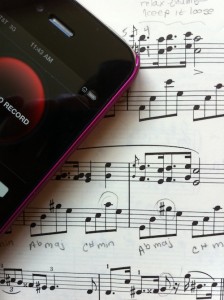Jeremy Denk says he never plays a piece of music the same way twice. Reading that, as a longtime fan of the celebrated pianist, reminded me of an issue I’ve been thinking about for a while: At what point will I have finished learning a composition? Does the finish line come when I have played the music at a consistent tempo? Or when I’ve performed the music for an audience? Does finishing mean playing without hitting wrong notes? Until recently, I thought that by achieving one of these goals, I could claim the piece finished and move on. I was wrong.
A year ago I began learning Mozart’s Piano Sonata in G Major, K 283. Not surprisingly, the first movement, Allegro, was filled with a slew of rhythmic challenges including tricky dotted 8th notes and fast-paced 16ths. Tiresome practice of coordinating trills in one hand while playing 16th notes in the other left me shamelessly crawling back to bed. But after months of lessons and practice, finally conquering those rhythmic challenges, I felt ready to perform the music. I did so on three different occasions, gaining confidence and playing better each time. Believing I was finished with the first movement, I forged ahead with the next two.
I found the second movement, a lyrical and beautiful Andante, to be less of a struggle, but the third movement, a Presto, proved much more challenging. A morning spent trying, but failing, to coordinate my hands in the opening measures left me doubting my pianistic endeavors. Had I felt this discouraged in a lesson, I would have had the luxury of an encouraging pep talk from my teacher. But, that morning, alone in my living room, I did the next best thing and returned to a finished piece.
Flipping back to the first movement, I was able to hum the melody of the dotted 8ths and, without thinking, my fingers knew exactly where to go. As I moved through the pages, confidence now restored, fatigue long forgotten, it was as if I was playing this music for the first time. Even better, I liked what I heard.
I discovered previously buried harmonic chords and accented them because it sounded good to do so. Whereas those chords had been terribly understated in my previous playing, I now played them staccato, and against the melody line of rapid 16th notes, I was able to drive the music forward, playing with much more enjoyment than I had before. Those long months of learning the notes and rhythms enabled me to shut the thinking side of my brain off and rely on emotions to express the music’s energetic pulse. My previous performances must have been akin to a poet reciting stanzas without any vocal inflection or phrasing.
It turns out that the aspect of piano study I had once thought of as difficult, learning the notes, is actually the easy part. The hard part is interpreting the music and infusing it with feeling. Otherwise, those notes, no matter how long it takes to learn them, are merely dots on a page.
So is there a finish line at all? Not for me. Taking my cue from Jeremy Denk, I hope to play that movement just a little bit differently next time.





Another wonderful, insightful essay! I feel the same way when re-reading a classic; always more to discover. Mozart would be proud.
Thank you for those very nice thoughts. I too feel the same way about re-reading a classic, and wish i did more of it.
Great article Robin. You are definitely right, just playing the notes isn’t enough. We must take the extra time to infuse our playing with dynamics and emotion or else our playing falls flat. It’s like cooking without spices; it makes for one bland meal.
Ha, ha: Thanks Lesley, and I love your comparison to the bland meal!
Hi admin, your blog is fantastic i know very useful tool for every
webmaster (for content creation and SEO). Just type in google for:
Stoonkel’s Rewriter